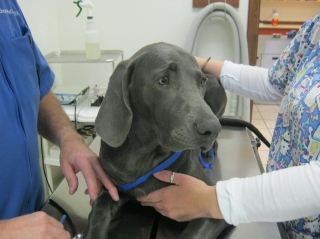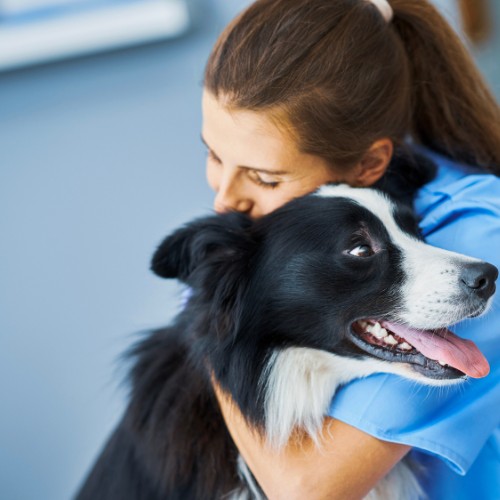Wellness care is important for your pet.
Through all stages of your pet’s life, we’ll be there to ensure they are properly taken care of.
Ongoing wellness care is the backbone of your pet’s overall health.
All pets are different, and we’ll be sure to put together a plan that is specialized for your pet’s specific needs for all stages of their life.
At Kenai Veterinary Hospital, we believe that preventative care is critical for a healthy, happy, long-lived pet. Pets age faster than people, and most pets are mature by age two. At seven years of age, many pets are entering their senior years. Because cats and dogs age so rapidly, significant health changes can occur in a short period. Many diseases can be treated if caught before irreversible damage has occurred. Therefore we recommend annual physical examinations to help us diagnose, treat or prevent problems before they become life-threatening. During these examinations, we will discuss immunizations and other preventative programs. We’ll examine all of the body systems and may recommend blood and urine tests, radiographs, or other diagnostic measures to ensure early detection of disease. We also provide health examinations for interstate and international travel. All records are computerized, paperless, and securely backed up.
We protect your pet from disease.
Today’s pets live longer, healthier lives than ever before—in part because of vaccines that help protect them from deadly infectious diseases. Over the years, vaccination against dangerous diseases has saved millions of pets and virtually eliminated some fatal diseases that were once common. Unfortunately, many infectious diseases still pose a significant threat to dogs and cats that are unvaccinated. Although vaccinations are highly successful and considered routine today, caregivers and pet owners cannot afford to become complacent about keeping pets up-to-date on their vaccinations.
Many vaccines are available for use in dogs and cats, but not every pet needs every available vaccine. Some vaccines are considered core and should be administered to all pets, including strictly indoor pets. Other vaccines are non-core or optional and may be recommended for pets based on a variety of factors, such as their risk for exposure to disease. Detailed information and the latest recommended protocols can be found on the websites of the American Animal Hospital Association and the American Association of Feline Practitioners. Kenai Veterinary Hospital vaccination protocols are based on these recommendations and are detailed below. Recommendations can change throughout a pet’s life as lifestyle and travel habits change. We will consider all these factors when we determine which vaccines your pet should receive.
Canine Vaccines
There are two core canine vaccines for our area. The first contains the distemper, parvo, hepatitis, and parainfluenza viruses, all combined into one vaccine. The product we use is Pfizer’s Vanguard Plus 5. We begin vaccinating puppies with this vaccine at 7-8 weeks of age. A series of three vaccinations are administered, each at 8, 12, and 16 weeks of age. The second core canine vaccine is rabies. The product we use is Merial’s Imrab 3TF. Rabies vaccination is performed along with the third Vanguard Plus 5 vaccination at 16 weeks of age. Deworming with pyrantel pamoate is routinely performed at 8 and 12 weeks of age.
Upon completion of your puppy’s vaccination series, it will be protected for a year, at which time we will booster both the Vanguard Plus 5 and the rabies vaccinations. After these annual boosters, your dog will only need these core vaccinations every third year for the rest of its life.
Another commonly required immunization is the canine bordetella or “kennel cough” vaccination. It is considered a non-core vaccine and is not routinely administered. Most boarding facilities require this vaccination. Also, if you participate in dog classes, agility trials, and dog shows, or if you take your dog to the groomer frequently, it would be a good idea to protect your dog with this vaccination. Depending upon the patient’s size and personality, we use either an intranasal or an oral vaccine for the initial vaccination. It provides a year of protection for your dog. Thereafter, if revaccination is required, the vaccine will be administered by injection annually.
Feline Vaccines
There are two core feline vaccines for our area. The first contains the distemper, rhinotracheitis, and caliciviruses, all combined into one vaccine. The product we use is Pfizer’s Felocell 3. We begin vaccinating kittens with this vaccine at 7-8 weeks of age. A series of three vaccinations are administered, each at 8, 12, and 16 weeks of age. The second core feline vaccine is rabies. The product we use is Merial’s Imrab 3TF. Rabies vaccination is performed at 16 weeks of age along with the third dose of Felocell 3. Deworming with pyrantel pamoate is routinely performed at 8 and 12 weeks of age.
Upon completion of your kitten’s vaccination series, it will be protected for a year, after which we will booster both the Felocell 3 and the rabies vaccinations. After these annual boosters, your cat will only need these core vaccinations every third year for the rest of its life.
The feline leukemia vaccine is considered non-core but is highly recommended for all kittens by the American Association of Feline Practitioners. We vaccinate kittens with Pfizer’s Leukocell 2 vaccine at 12 and 16 weeks of age. All cats are then administered a booster dose of Leukocell 2 one year later. If your cat lives strictly indoors, it will not need any further leukemia vaccinations. However, if your cat is allowed outside at all or lives with another cat that goes outside, it should receive the feline leukemia virus vaccine once every two years through age ten.

We're here for you.
Use the links below to explore our services or schedule an appointment. If you have any questions, please call us directly at 907-283-4148.


